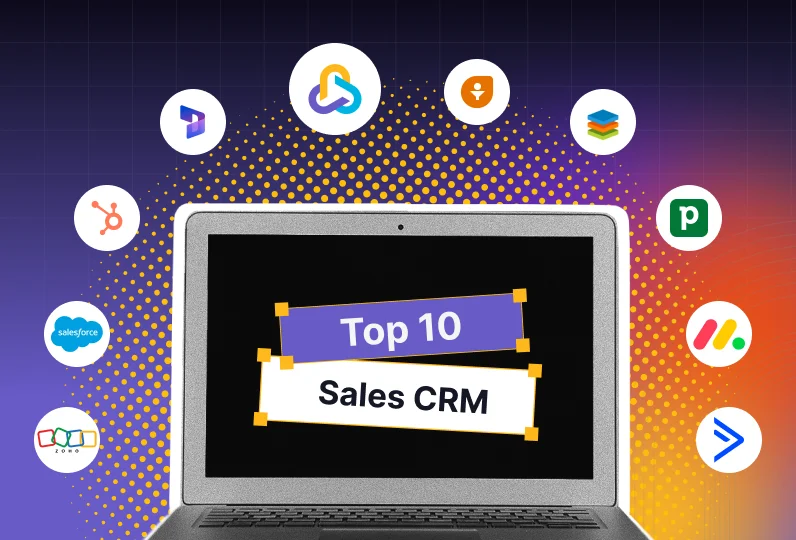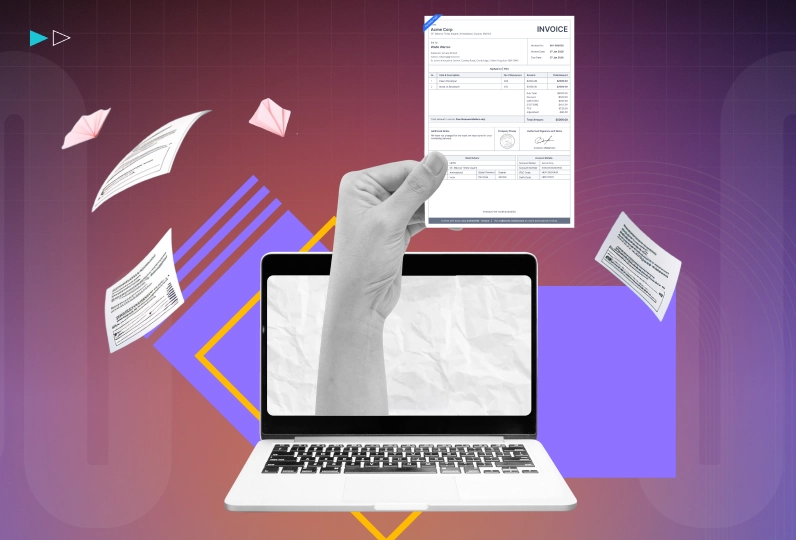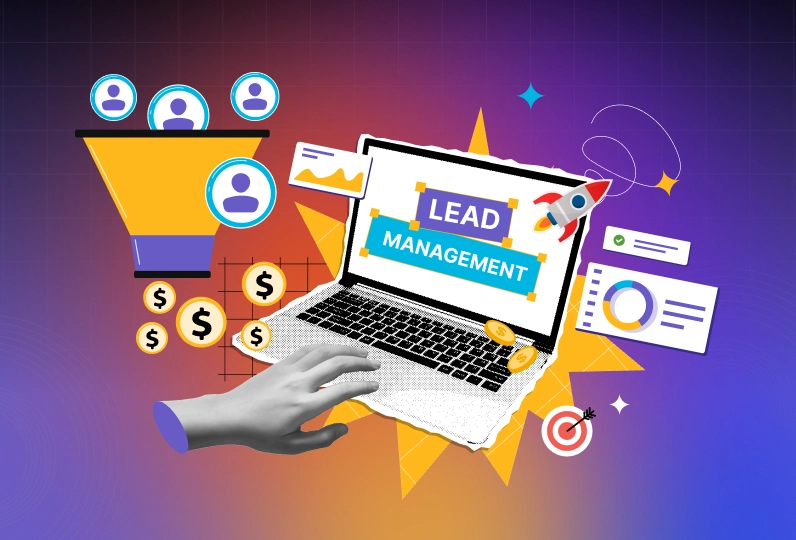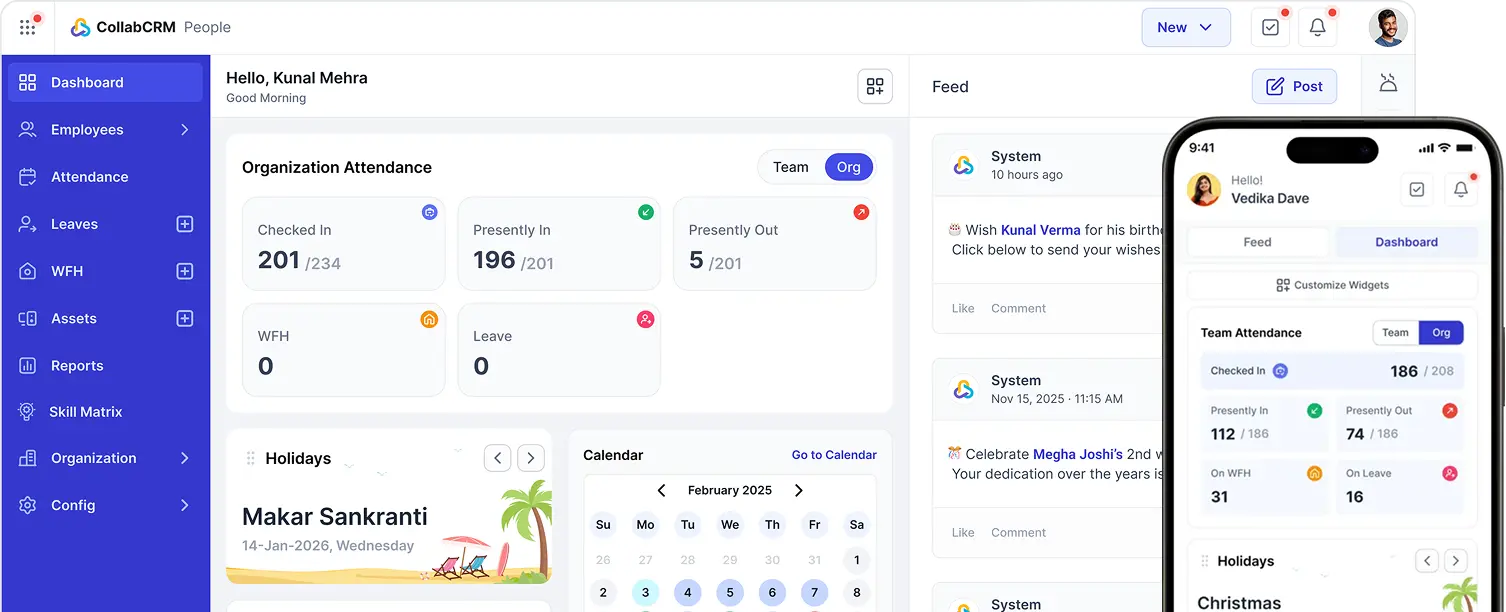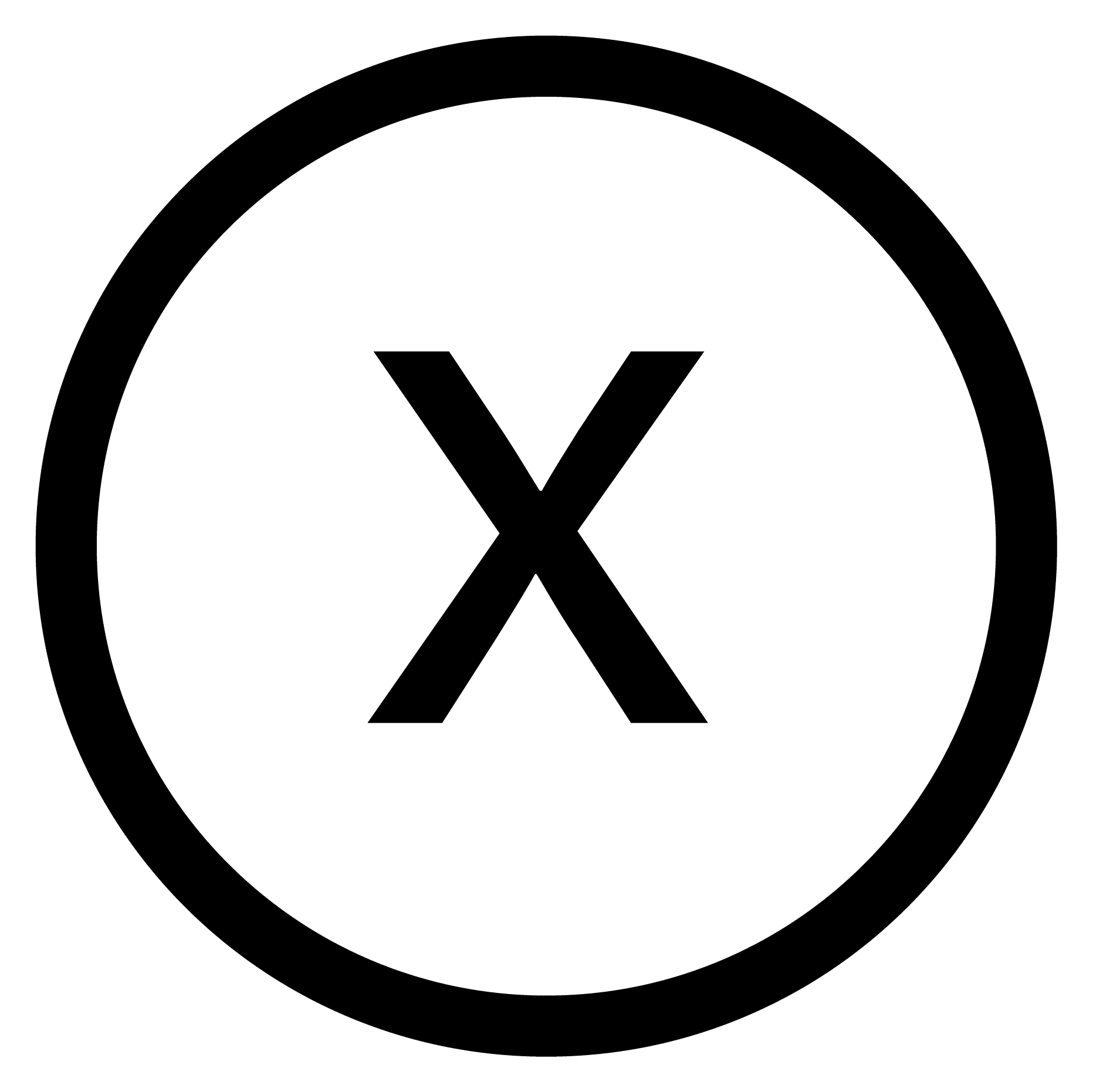Sales teams today juggle countless tasks, tracking leads, following up with prospects, and keeping pipelines organized. Without the right CRM software for sales, opportunities slip through the cracks and growth slows. Modern sales management software puts everything into view, helping teams manage contacts, track deals, and forecast growth accurately.
It helps teams manage contacts efficiently, track deals at every stage, forecast growth with data-driven insights, and automate repetitive tasks that consume valuable time. But what are the best sales CRM tools that help streamline your processes, boost productivity, and accelerate revenue growth?
This blog compiles the top 10 sales CRM software for 2026, platforms designed to help teams stay organized, automate repetitive tasks, track deals, and forecast growth with confidence. Whether you’re a startup building your first customer base or an enterprise managing complex pipelines, these tools can transform the way your team sells.
Key Takeaways:
- The right CRM software for sales drives revenue growth by streamlining lead management, automating follow-ups, and giving sales teams full pipeline visibility.
- Collaboration and usability are critical; a CRM like CollabCRM ensures teams work together seamlessly without overcomplicating workflows.
- Scalability and integration give an edge; the right CRM grows with the business and connects with existing tools.
- Data and insights accelerate sales, and strong analytics improve forecasting and sharpen strategy.
- The best CRM is the one sales teams use every day.
Top 10 Sales CRM Software to Drive Revenue and Growth
When exploring CRM software for sales to drive revenue and growth, consider using platforms like CollabCRM, Salesforce CRM, HubSpot, Microsoft Dynamics 365, Zoho CRM, Freshsales, SugarCRM, Pipedrive, Monday.com CRM, and ActiveCampaign.
These sales CRM tools collectively help businesses manage pipelines, improve sales team productivity, centralize customer data, and enable better decision-making. Here is a detailed breakdown of each to help you pick the best one among the popular CRM tools available out there in the market.
1. CollabCRM
CollabCRM is a purpose-built business operating software designed to help teams manage pipelines, deals, and client relationships with unmatched efficiency. Unlike general-purpose CRMs, CollabCRM is more than a sales CRM as it prioritizes sales operations, offering features that streamline every step of the sales cycle, from lead capture and deal tracking to follow-ups, client interviews, and project integration.
Its intuitive interface, real-time dashboards, and seamless integration with administrative portals empower teams to stay organized, collaborate effectively, and make data-driven decisions. With unique modules such as client interviews and automated proposal tracking, CollabCRM stands out as the best sales CRM software that not only manages sales but also actively accelerates revenue growth.
Key Features
- Monitor leads with detailed statistics, trends, and funnel views, segmented by type, source, and region.
- Track deals through every stage of the pipeline, manage proposals and projects, record follow-ups, and visualize deal evolution.
- Set and monitor sales goals, track employee performance, leaderboard rankings, close rates, and team objectives.
- Centralize all client and prospect information with editable records, notes, attachments, and visibility into associated leads and deals.
- Record, manage, and track client interview details and statuses to retain valuable insights for follow-ups and relationship building.
- Adapt pipelines, lead and deal types, statuses, sources, and operational settings to match your unique sales processes, with the ability to export data for reporting.
- CollabCRM unites people, projects, and sales on one platform, eliminating the need for multiple tools, removing silos, boosting collaboration, and streamlining growth.
Strengths
- Sales-Centric Design: Every feature is optimized for managing pipelines, deals, and sales activities, ensuring teams can focus on closing deals efficiently.
- Client Interviews (USP): A unique module not found in other CRMs, allowing seamless scheduling of client interviews with internal resources via the People Portal, notifying team leads for resource allocation.
- Deal Evolution & Proposals: Track deals through multiple phases, and leverage fully automated e-sign proposals with stage tracking and read receipts to streamline the sales process.
- Projects Integration (USP): Connect CRM data directly with the project management system, providing visibility and continuity between sales and project execution.
- Estimations & Follow-Ups: Set follow-ups directly in the system and have them appear in your To Do list, keeping sales teams on top of every opportunity.
- Website Integration: Seamless integration with the administration portal and API manager ensures all leads from your website flow automatically into the CRM.
- Customizable Lead/Deal Sources: Track inbound and outbound sources for efficient reporting and better insight into lead generation effectiveness.
Limitations
- As of now, only catering to IT companies.
- Provide limited integrations
Best For
Small to mid-sized IT companies that need focused, easy-to-use sales lead management software to handle pipelines, improve collaboration, and drive sales productivity without unnecessary complexity.
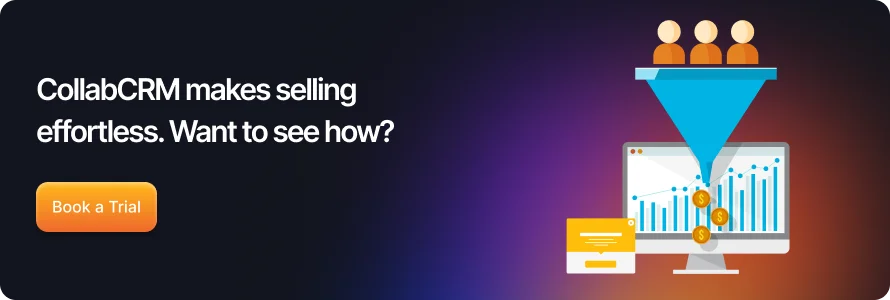
2. Salesforce CRM
Salesforce CRM is one of the most widely used, established, and popular CRM tools in the world. Known for its robust customization and scalability, it caters to businesses of all sizes, from startups to global enterprises. Salesforce provides advanced sales management, customer engagement, and analytics capabilities, making it a go-to option for organizations with complex sales structures.
Key Features
- Highly customizable sales pipelines and workflows
- Advanced reporting and analytics
- Lead tracking and management
- Extensive integration marketplace
- Mobile app for sales teams on the go
Strengths
- Flexibility: Highly customizable to match unique business processes.
- Enterprise-grade Capabilities: Handles complex sales structures, multiple territories, and layered hierarchies.
- Rich Ecosystem: AppExchange marketplace provides thousands of integrations and add-ons.
- Scalability: Suitable for both small teams and large multinational organizations.
Limitations
- It has a steep learning curve that requires time and expertise to implement effectively.
- It can become expensive, especially if advanced features and add-ons are added.
- Often requires dedicated admins or consultants to maintain and customize.
Best For
Salesforce CRM is ideal for mid-sized to large organizations that require a highly customizable and scalable sales lead management software. It suits businesses with complex sales processes, multiple teams or territories, and a need for advanced reporting, automation, and integration capabilities.
3. HubSpot CRM
HubSpot CRM is a well-known CRM software for sales that brings together marketing, sales, and service tools under one umbrella. It’s particularly popular among businesses seeking a solution that integrates inbound marketing with sales activities. HubSpot makes it easy for teams to get started quickly and provides a polished experience across contact management, pipelines, and reporting.
Key Features
- Deal and pipeline management with drag-and-drop functionality
- Built-in task assignment and management functionalities
- Sales automation workflows to streamline follow-ups
- Centralized contact database with marketing and service integration
- Real-time dashboards and customizable reports
Strengths
- Ease of use: HubSpot’s interface is intuitive and user-friendly, making adoption simple for sales teams.
- All-in-one ecosystem: Sales, marketing, and service modules work seamlessly together, ensuring alignment across teams.
- Strong automation: Automates repetitive tasks like follow-ups and reminders, freeing sales representatives to focus on closing deals.
- Scalability: Offers growth paths for companies as they expand, with different hubs and tiers.
Limitations
- Customization can be restrictive for complex sales processes that require multiple pipelines or advanced configurations.
- Advanced sales management features are limited compared to dedicated sales CRMs.
- Pricing increases with scale, especially when advanced functionality or larger teams are involved.
Best For
Businesses that want a simple, integrated platform where marketing and sales work hand in hand and where ease of use is a top priority.
4. Microsoft Dynamics 365
Microsoft Dynamics 365 CRM is a cloud-based platform designed to unify sales, marketing, customer service, and operations. It’s particularly favored by organizations already using Microsoft products, as it integrates seamlessly with Office 365, Teams, and Azure. Dynamics 365 provides robust tools for managing customer relationships and sales processes across mid-sized to large enterprises.
Key Features
- Customizable sales pipelines and opportunity management
- Advanced reporting and insights for sales performance
- Integration with Microsoft Office 365, Teams, and Power BI
- Automated workflows for sales activities and follow-ups
- Customer service and marketing modules for end-to-end engagement
Strengths
- Deep integration with the Microsoft ecosystem: Ideal for organizations using Outlook, Excel, Teams, or Power BI.
- Flexibility and customization: Can be tailored to fit complex sales processes and multiple business units.
- Scalability: Supports small teams to large, global enterprises.
- Comprehensive functionality: Combines CRM, ERP, and analytics for a full business management solution.
Limitations
- Requires careful setup and sometimes IT support to configure effectively.
- Users may require training to fully utilize the platform.
- Advanced modules and customization can increase total ownership cost significantly.
Best For
Organizations already invested in the Microsoft ecosystem or businesses that need a highly configurable CRM software for sales to handle complex processes and customer service operations.
4. Zoho CRM
Zoho CRM is a cloud-based platform that helps businesses manage leads, contacts, deals, and sales pipelines. It offers a practical set of tools for small to mid-sized teams and integrates with other Zoho apps and popular third-party software.
Key Features
- Customizable sales pipelines and deal management
- Workflow automation for tasks, emails, and follow-ups
- Real-time dashboards and analytics for basic sales tracking
- Integration with the Zoho suite and third-party apps
Strengths
- Accessibility and Simplicity: Has an easy setup, making it simple for teams to test and explore the platform.
- User-friendly: Simple interface suitable for small teams.
- Automation Basics: Helps with repetitive tasks and follow-ups.
Limitations
- May not handle very complex sales processes.
- Larger or distributed teams may need additional customization.
- Advanced analytics are limited compared to enterprise CRMs.
Best For
Small to mid-sized businesses seeking a straightforward CRM software for sales that’s easy to try, with basic automation and reporting capabilities.
5. Freshsales
Freshsales is a CRM platform from Freshworks that helps businesses manage leads, deals, and customer interactions. It combines basic sales management tools with simple automation and reporting features, making it suitable for small to mid-sized teams.
Key Features
- Deal and pipeline management with a visual interface
- Email tracking and automated follow-ups
- Lead scoring and activity tracking
- Basic reporting and dashboards
- Integration with Freshworks suite and third-party apps
Strengths
- Quick to get started: Simple setup and intuitive interface make it easy for teams to begin using it without extensive training.
- Automation for routine tasks: Streamlines follow-ups and basic workflows.
- Unified view of contacts: Keeps customer information centralized and accessible.
Limitations
- Complex sales processes may require workarounds.
- Less robust than enterprise-level CRMs.
- May need additional modules or upgrades for larger teams.
Best For
Small to mid-sized teams looking for a straightforward CRM that is quick to adopt and offers basic automation and reporting.
6. SugarCRM
SugarCRM is a flexible CRM platform designed to manage customer relationships, sales pipelines, and workflows. It’s often chosen by businesses seeking a more customizable sales management software that can adapt to specific processes without forcing a rigid structure.
Key Features
- Customizable sales pipelines and modules
- Workflow automation for tasks and follow-ups
- Advanced reporting and dashboards
- Integration with third-party tools and APIs
- Role-based access and team management
Strengths
- Flexible customization: Adapts to different sales processes and business models.
- Centralized customer data: Keeps sales teams informed with a single source of truth.
- Automation of repetitive tasks: Helps teams stay organized without extensive manual work.
Limitations
- Setup and customization can take time for new users.
- More advanced functionality can increase total ownership costs.
- Not as intuitive as some newer cloud CRMs, requiring adaptation by teams.
Best For
Organizations seeking a customizable CRM that can align with unique sales processes and workflows, especially when flexibility is a priority over out-of-the-box simplicity.

7. Pipedrive
Pipedrive is a sales-focused CRM designed to help teams manage deals and pipelines with ease. Its visual interface and simple workflow tools make it a popular choice among small to mid-sized sales teams that want a straightforward system for tracking opportunities.
Key Features
- Visual deal and pipeline management with drag-and-drop stages
- Email tracking and scheduling
- Workflow automation for repetitive tasks
- Reporting dashboards for sales performance
- Marketplace with third-party integrations
Strengths
- Pipeline-centric design: The interface is centered around deals, making it easy for sales reps to track progress.
- Quick adoption: Setup and onboarding are simple, with minimal training required.
- Automation basics: Helps sales teams stay on top of follow-ups and routine activities.
Limitations
- Limited ability to handle very complex or multi-layered sales processes.
- Analytics are adequate but less advanced compared to enterprise CRMs.
- Better suited for small to mid-sized teams rather than large enterprises.
Best For
Small to mid-sized sales teams that want a pipeline-first CRM that is easy to set up and use, without the complexity of larger platforms.
8. Monday.com CRM
Monday.com CRM is a customizable platform built on the broader Monday.com work management system. It allows teams to manage leads, deals, and pipelines while also offering project management and collaboration features. Its flexibility makes it appealing to businesses that want a CRM that can adapt to different workflows.
Key Features
- Customizable boards for deals, contacts, and pipelines
- Automations for repetitive tasks and notifications
- Centralized communication with email and activity tracking
- Integration with tools like Gmail, Outlook, Slack, and Zoom
- Visual dashboards to track sales performance
Strengths
- Flexibility: Can be customized to fit a variety of workflows beyond just sales.
- All-in-one Workspace: Combines CRM with project and task management features.
- User-friendly: Visual interface makes it easy to understand and adopt.
Limitations
- Core CRM functions are less advanced than dedicated CRMs.
- Building out sales processes may require more setup time.
- May not meet the complex needs of larger sales organizations.
Best For
Teams that want a flexible platform combining CRM with project management and collaboration, especially in small to mid-sized organizations.
9. ActiveCampaign
ActiveCampaign is primarily a marketing automation and customer experience platform that includes lightweight CRM functionality. The sales management software is designed to help businesses connect marketing campaigns with sales activities, making it more suitable for teams that value email and customer journey automation alongside basic deal tracking.
Key Features
- Contact and deal management with simple pipelines
- Advanced email marketing and automation workflows
- Customer journey mapping and behavior tracking
- Integrations with eCommerce and marketing tools
- Reporting for campaign and sales performance
Strengths
- Powerful marketing automation: Excels at email campaigns and nurturing leads.
- Unified marketing and sales view: Helps align campaigns with sales pipelines.
- Easy to try: Offers trial and straightforward onboarding for small teams.
Limitations
- CRM features are basic compared to dedicated sales platforms.
- Limited ability to tailor pipelines for complex processes.
- Stronger on marketing than on core CRM and sales operations.
Best For
Businesses that prioritize marketing automation and want basic CRM functionality to connect campaigns directly to sales activities.
What to Look for While Choosing Sales CRM Software?
When evaluating sales management CRM systems, consider factors like usability, scalability, integration, automation, analytics & reporting, customization, mobile access, pricing & support. These elements collectively help streamline your sales processes, improve team efficiency, and ensure smoother adoption across the organization. Take a closer look at these aspects to ensure the CRM aligns with both your current needs and future growth.
| Factor | Why It Matters |
| Usability | An intuitive interface ensures your team can adopt the CRM quickly without extensive training. |
| Scalability | Handles growing numbers of users, leads, and deals as your business expands. |
| Integration | Works seamlessly with email, marketing tools, communication apps, and other business systems. |
| Automation | Reduces manual work by automating repetitive tasks like follow-ups, lead assignments, and reminders. |
| Analytics & Reporting | Provides actionable insights, tracks sales performance, and enables accurate forecasting. |
| Customization | Tailors the CRM to match your workflows, sales stages, and business processes. |
| Mobile Access | Lets your team manage leads, deals, and tasks from anywhere. |
| Pricing & Support | Ensures cost-effectiveness and reliable customer support for long-term use. |
Conclusion
Each of the sales CRM tools on this list offers its own strengths, from user-friendly platforms suited for small teams to highly customizable systems designed for complex enterprises. The best choice ultimately depends on your organization’s size, sales processes, and priorities.
Some businesses may benefit from all-in-one solutions that combine marketing and sales, while others may need dedicated platforms with advanced reporting and automation. What matters most is adopting a system that aligns with your team’s workflow and supports long-term scalability.
With the right sales management software in place, sales teams can move beyond guesswork, make data-driven decisions, and set themselves up for sustainable growth.
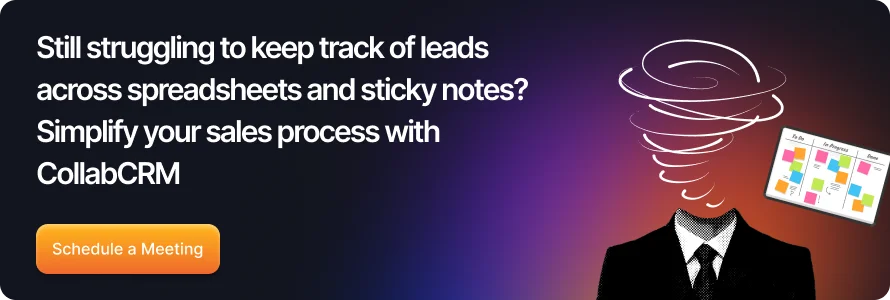
FAQs on Sales CRM Tools
Sales CRM software is a tool that helps businesses manage and optimize their sales processes. It centralizes customer and lead information, tracks deals, automates follow-ups, and provides insights into sales performance.
CRM software is a system that manages interactions with current and potential customers. It stores contact information, tracks communication, and helps teams nurture relationships. Beyond sales, it can support marketing, customer service, and collaboration across departments.
Sales CRM software streamlines lead management, improves pipeline visibility, and automates repetitive tasks. It enhances team collaboration, enables better forecasting, and provides data-driven insights to make smarter decisions. Ultimately, it helps businesses increase sales efficiency and revenue.
CRMs like CollabCRM, Salesforce, HubSpot, Zoho CRM, and Pipedrive are currently in high demand. Businesses favor platforms that are easy to use, scalable, integrate with other tools, and provide automation and AI-powered insights to improve sales performance.
CRM strategy in 2026 focuses on personalization, automation, and predictive analytics. Businesses aim to deliver seamless customer experiences, integrate AI-driven insights, and align sales, marketing, and support teams for better decision-making and growth.
The four main types of CRM are operational CRM (manages sales, marketing, and service), analytical CRM (analyzes customer data), collaborative CRM (facilitates communication across teams), and strategic CRM (focuses on long-term customer relationships and business goals).
Most modern CRM platforms like CollabCRM are designed to be user-friendly with intuitive interfaces. While advanced features may require some training, basic functions like managing contacts, tracking deals, and running reports are generally easy to learn and use.
